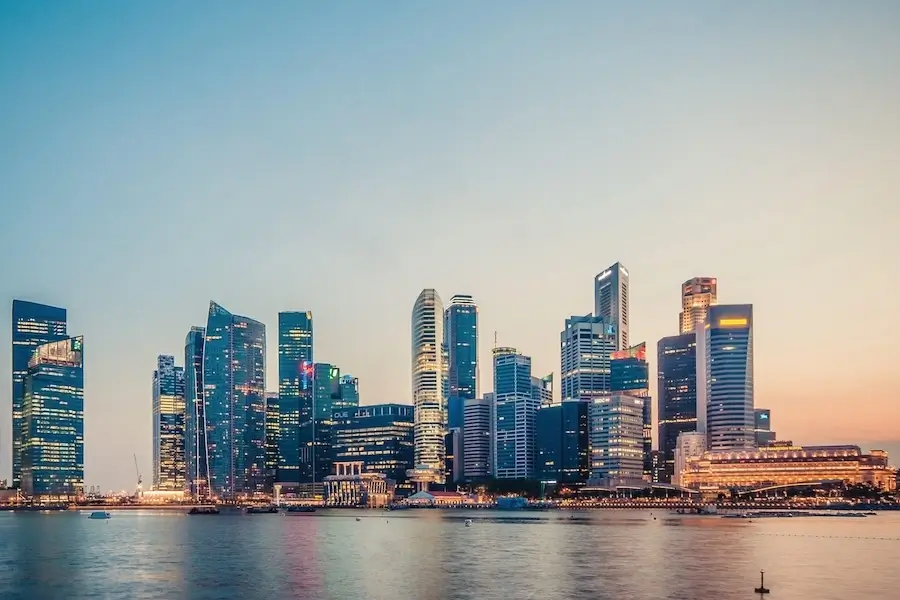Benefits of Choosing Singapore for Your Business
How do you pick the right country for your business, when many countries are touting their advantages? Governments across the globe are cutting business taxes, implementing entrepreneur-friendly policies, launching their own venture capital funds — all in the hope of attracting the next Uber, Apple, Google, Microsoft, or Amazon.
Amidst this global competition, Singapore emerges as a compelling choice for incorporation, boasting a myriad of benefits for businesses. Let's explore top-8 key factors why Singapore stands out as a prime destination for entrepreneurs seeking to establish and grow their companies.
How We Choose Factors to Consider Where to Launch Your Business?
CorporateServices.com conducted a survey of more than 100 business founders from five countries — India, UK, USA, Japan, and Australia — who have launched their businesses in Singapore. Every participant in the survey was leading a startup that had received external funding and employed more than ten employees. The participants were asked to rank the various factors they considered most important in selecting Singapore as a country to incorporate and grow their company. Let's delve into these eight key factors identified through the survey.
We will assess each factor using a five-point scale with possible ratings of Poor, Fair, Good, Excellent, and Outstanding.
#1 Ease to Incorporate and Conduct Business in Singapore
Fast and Simple Incorporation Process
For more than 10 years, World Bank has ranked Singapore in the top 3 countries among 190 countries for its ease of doing business. Registering a new company in Singapore is simple, efficient, and quick. The total time can be anywhere from 1 day to a few days. The corporate compliance rules are straightforward and easy to follow. Startups can follow these rules without excessive red tape or financial burden. For small and mid-sized firms, the basic rules can be summarized as follows:
- Accounting standards must be followed and taxes must be filed on a timely basis.
- Government records must be updated in a timely manner whenever there are changes to the company structure.
- Employment regulations must be complied with.
- Personal data of employees and customers must be protected.
- Competition between markets must be kept open, and
- Certain industrial sectors require that the business obtain a permit or license to operate.
These relatively simple and easy-to-follow regulations make corporate compliance significantly less onerous than in most other countries.
Singapore Business-Friendly Regulations for Foreigners
Singapore’s corporate tax policies are pro-market, and these tax benefits extend to companies owned by foreigners. Foreign-owned businesses also benefit from open ownership rules and minimal controls on currency movement. The government allows foreigners to own 100% of the stock of a company incorporated in Singapore, without the need to have local partners or shareholders. This enables startups to adopt the capital structure that is suitable for them rather than be forced into something the government desires. There are no restrictions on capital movement into or out of Singapore. These factors allow startups to function freely, with easy access to funds and without onerous laws.
Our assessment of how Singapore ranks on business-friendly policies: Outstanding
#2 Access to Startup Resources and Incentives
Singapore is a small country with a population of less than 6 million. Yet, with more than several thousand startups launched each year, dozens of investment funds and angel investor networks, more than 50 co-working spaces, and an emerging culture of entrepreneurship, Singapore is aiming to make the country the “startup factory” of Asia.
Government Grants and Support
Singapore’s government is supportive of startups and provides many resources for new businesses, including grants, tax incentives, and in-kind assistance. The type of help available depends on your startup’s needs as well as its ability to meet the qualifying requirements. Many of the resources become available simply by incorporating your startup in Singapore. Singapore’s government has created several funds and grants that target specific emerging industries. Nearly all large global VC funds have a presence in Singapore and target startups that are based here.
The free movement of international capital allowed by Singapore makes fundraising efficient and quick. The early-stage investor ecosystem in Singapore is stronger than ever before. The industry is international in character as more startups seek funding from seed, angel and venture capital investors, who may be based outside Singapore. With access to local and international capital, Singapore startups are not capital-constrained.
Singapore is a hub for innovation and technology, making it an attractive destination for entrepreneurs looking to launch an IT business. With a stable and business-friendly environment, a highly educated workforce, and a thriving tech industry, Singapore offers numerous advantages for IT companies.
Finally, Singapore has been described as the 1st freest economy in the world, making it a great place for startups to operate. You are able to set up a business in any sector; trade is not limited; and currency is strong and stable, allowing for capital to flow easily in and out of the country.
Our assessment of how Singapore ranks on accessibility of resources that are critical to startups: Excellent
Learn About Incentives
#3 Access to One of the Best Skilled Workforce
Today’s startups cannot succeed without a knowledgeable, skilled, and efficient workforce. Entrepreneurs and investors are therefore attracted to countries where a high-skill workforce can be hired at a reasonable cost.
Highly Educated English Speaking Talent Pool
Singapore ranks as the best country for developing human capital, according to a report released by the World Bank. The country’s education system is considered the best in the world by various international organizations (such as OECD, World Bank, and The Economist). The country’s high school students consistently rank at the top of the OECD's Programme for International Student Assessment (PISA) in the three main categories of mathematics, reading, and science.
Nearly every young or middle-age Singaporean speaks English. Singaporeans are some of the most productive and well trained workers in the world. The country’s excellent education system produces a workforce that is good at what it does, yet on wages it is extremely competitive with other countries. However, a common complaint about Singapore’s workforce is the lack of “creativity” in Singaporeans. Perhaps an educational system focused on cut-throat competition and a culture of obedience has created a rule-bound mentality that has impeded students from exploring the creative side of their brain. Singaporeans are very efficient, follow protocol, listen to instructions, plan ahead, and are very organized and analytical.
Singapore Immigration Policies
Singapore’s government recognizes these shortcomings and is implementing educational reforms that nurture creativity and innovation. At the same time, Singapore welcomes foreign talent and hopes to bring creative ideas to the city-state through this talent pool. The country has several immigration schemes that give preference to persons who can show a history of innovation and creativity, either in business or in the arts. In general, the state’s policies on immigration are liberal, especially when it comes to skilled foreign talent. For foreign entrepreneurs and skilled professionals, it is not difficult to acquire and maintain a work visa, which can be converted eventually to Permanent Residency in the country if the business becomes a success. Not only can you obtain a working visa to start a business, so can your employees from other countries. Thanks to these pro-immigration policies, the country attracts a large number of workers from all over the world.
Our assessment of how Singapore ranks on workforce talent: Excellent
#4 Singapore’s Robust Legal Framework
Singapore’s legal system is known for being fair, efficient and impartial, and it is ranked as the fifth least corrupt country in the world.
Absence of Corruption
Right from the nation’s inception, corruption has been limited because of the moral standards set and exemplified by the country’s founder, Lee Kuan Yew. Motivation to take bribes or commit other misdeeds within the government is low, by careful design. The country’s civil service selects top students and pays them very well so that they are not tempted by illegal offers of money or favors. For those who stray, strict punishment is meted out, further reducing the temptation to engage in corrupt behavior.
Rule of Law
Strong protections for contract law are in place with Singapore’s legal system. The laws themselves are strictly enforced by the courts, and its judiciary is respected worldwide for its neutrality, quality, fairness, and lack of political meddling. It is a testament to the country’s legal system that many large companies often mutually choose to apply Singapore law to their contracts even when neither party is located in the country.
Our assessment of how Singapore ranks on the rule of law: Outstanding
Considering Singapore?
Experienced team. Affordable cost. Online platform.
#5 Singapore’s Favorable Tax System
Taxes stand as a foremost concern for entrepreneurs, serving as one of the pivotal factors when deciding to set up a business anywhere in the world. Singapore has one of the world’s simplest and most rational tax system.
Newly incorporated companies in Singapore receive attractive tax breaks for the first three years of their operation: such companies are given a 75% tax exemption on the first S$100,000 of taxable income and an additional 50% exemption on the next S$100,000 of taxable income, while the rate for corporate taxes is capped at 17%. Furthermore, numerous tax deductions are available that promote R&D and productivity improvements by startups, thus further reducing the effective tax rate. Business losses can be carried forward to reduce future tax liabilities. Since 2002, Singapore has followed a single-tier corporate tax system. Corporate dividends are tax-exempt in the hands of shareholders, and companies are not required to deduct tax from dividends that are paid to shareholders.
Singapore also has no tax on capital gains. This means that if a business is sold, shareholders receive the full amount of the sale price tax-free, since no capital tax is to be paid. This is in sharp contrast to the tax policies of most countries, including the US, Germany, UK, Australia, Japan, India, Brazil, and China.
Selecting Singapore as the place to launch my startup and moving to Singapore was one of the best decisions of my life. I spent five years growing my business, but I was cash-flow positive after 14 months. By the third year, my company was generating more than 700,000 SGD in gross profit annually. Given the various tax incentives and R&D expense deductions, my effective tax liability on corporate income was less than 10%. At the end of each year, I declared dividends from the post-tax profits of my business. As a shareholder, I received the full dividend amount and I had to pay no further tax on this amount, either at the corporate or personal tax level.
“In my fifth year, I received an offer to acquire my company. I sold it for nearly 9.5 million SGD and received the full sale amount totally tax-free. Given my personal experience, my best advice to all entrepreneurs, no matter from which country, is — if you are serious about your business, incorporate in Singapore!
Double Taxation Avoidance Agreements
To make Singapore’s tax system even more appealing, the country assiduously avoids double taxation of its companies. It has signed Avoidance of Double Taxation Agreements (DTAs) with more than 50 countries. And for countries without DTAs, Singapore provides Unilateral Tax Credits (UTC).
Our assessment of how Singapore ranks on tax policies: Outstanding
#6 Strong IP Protection
Singapore constantly stands in the top 10 countries of the world on the protection and enforcement of Intellectual Property laws, according to this International IP Index.
The Singapore government actively supports and encourages the protection of intellectual property, making it one of the most secure countries for the protection of intellectual property rights. Through the government’s IP Hub Master Plan, Singapore protects IP rights with a very modern legal framework for patent, copyright and trademark laws, trade secrets protections, and industrial designs protections. All of these rights are mediated and enforced by Singapore’s efficient legal system. Many foreign companies for whom IP protection is of paramount importance (such as Microsoft, Meta, and Google) have selected Singapore because of these protections.
Our assessment of how Singapore ranks on IP policies: Outstanding
#7 Singapore's Strategic Location
Singapore’s central location in Southeast Asia makes it a physical and metaphorical gateway to the continent’s 3 billion people. Singapore’s Changi Airport has been named “world’s best airport” for the seventh consecutive year by Skytrax. Over 20 million passengers enter or depart from the airport each year, and flights to major cities around the world are available daily. Some of the largest economies in the world — such as China, Japan, Australia, and India — are a short flight away. For any entrepreneur, having convenient access to other major markets is an important factor.
The port of Singapore is one of the busiest in the entire world and is classified as a major International Maritime Center.
Ease of Global Expansion
Singapore also provides a range of assistance programmes to help startups expand globally. These grants can be used to perform market research, hire marketing staff, or perform contract negotiations.
Singapore’s corporate laws provide very good support for a holding company structure. Therefore, Singapore is an ideal place to set up a holding company that expands overseas through subsidiaries. Other advantages such as an extensive network of double tax treaties, ease of capital flow, no currency restrictions, etc. have already been highlighted in this article.
#8 High Quality of Life in Singapore
The majority of foreign-born professionals and entrepreneurs who establish businesses and relocate to Singapore typically do so with their families. Among the primary concerns for new residents in Singapore is the quality of life.
Singapore is ranked as the safest country in Asia and the third safest city in the world. Nearly all of the infrastructure in Singapore — from information and communications to transport and water sanitation — is modern and world-class. Recently, the World Economic Forum’s Global Technology Report named Singapore as the most “tech-ready” nation.
Things You May Not Like About Singapore
Conclusions
Singapore is a country with limited resources, but it has managed to achieve world-class economic growth by focusing on its core proficiencies. Singapore’s current strengths are excellent infrastructure, a technologically advanced industrial sector, pro-business policies, excellent global reputation, and pro-growth, reform-oriented economic policies.
While it can be stressful to start a new business, Singapore is a very attractive choice because the country makes it easy to plant roots for your business and thrive. It is a world-class economy and a rich culture, full of opportunities for people with innovative ideas and the drive to create a successful business. With many programs focused on supporting foreign startups, in particular, it’s fast becoming a popular home to entrepreneurs from around the world.
Considering Singapore?








